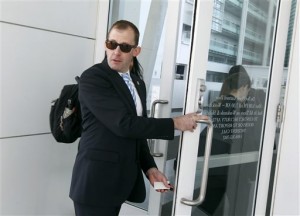
A former member of a polygamous religious sect that is the focus of a discrimination trial in Arizona described on Thursday how he suddenly became the victim of vandalism and intimidation after he left the church.
Isaac Wyler said he complained to local authorities hundreds of times after his horse property was vandalized, including water lines and fences being cut, but the police did nothing because he was no longer a member of the church. He also described finding a dozen dead cats on his property after leaving the church.
“There are two sets of rules depending upon who you are,” Wyler told the jury in U.S. District Court.
Wyler is the second former member of the Fundamentalist Church of Jesus Christ of Latter Day Saints to testify at the trial on behalf of the U.S. Justice Department. The sect broke away from mainstream Mormonism when the latter disavowed polygamy more than 100 years ago.
The Justice Department accuses Colorado City, Arizona, and Hildale, Utah, of functioning as an arm of the church and discriminating against nonbelievers by systematically denying them housing, water services and police protection.
Police officers are accused of failing to investigate crimes against nonbelievers and assisting leader Warren Jeffs while he was a fugitive on charges of arranging marriages between girls and older men.
The communities deny the allegations and say religion isn’t a motivating factor in their decisions. They believe the government is discriminating against them based on their religion.
The case marks one of the boldest efforts by the government to confront what critics have said was a corrupt regime in both towns.
Wyler on Thursday provided a look into life in the towns. He says his hometown of Colorado City had parades, fairs and other happy social gatherings when he was growing up, but those activities ended after Jeffs took over as the church’s top leader.
“Everything changed,” Wyler said.
Wyler said although he was forced out of the church in 2004, he actually started to turn against it after he heard Jeffs call for the executions of the attorneys general of Arizona and Utah.
“That shook me up real bad,” Wyler said. “I don’t feel like I signed up for any religion like this.”
After leaving the church, Wyler went on to work part-time as a consultant for a communal land trust that was once run by Jeffs but was seized by the state of Utah in 2005 amid allegations of mismanagement by church leaders. The fund is now controlled by the state and controls the housing within the community.
Wyler cited his work for the trust as evidence of how town leaders treat non-believers differently. He was once charged and convicted of trespassing for carrying out an eviction in his work for the trust, but noted that none of his complaints about vandalism at his property ever led to arrests.
“I feel like my complaints go into a bin that says garbage on it,” he said.




